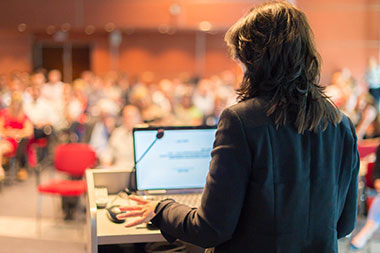
Individual therapy sessions
Our professional speech-language therapists work with children and adults individually to provide intensive, one-on-one, family-centered therapeutic intervention. In conjunction with parents and caregivers, our speech-language therapists will develop an individualized therapy plan with short and long term goals addressing specific areas in need of improvement.

Group therapy sessions
Research shows that in certain situations, group therapy for communication disorders is actually more effective in achieving progress rather than individual therapy. Group therapy is also more cost-effective than individual therapy, and it allows children to interact with their peers.
Groups are available for the following conditions (whether primary or secondary conditions):
- Articulation and / or phonological disorders
- Language disorders
- Language delay
- Pervasive developmental delay
Group sessions are offered upon availability.

Language stimulation groups
Language development groups are specifically designed to help children develop their speech and language skills, as well as their pragmatics and social skills, through a fun, child-centered, play-based approach.
These groups serve the ages of 2-3, 3-4, 4-5 year olds.
Group sessions are offered upon availability.

Social pragmatic groups
Social pragmatics language skills are applied whenever we need to interact with another person, even if we are not interacting directly with that person. They include verbal communication (what one person says to another), as well as non-verbal communication (what a person's face and / or body conveys without using words). Understanding the communicative message during social interaction includes both verbal and non-verbal communication.
Social pragmatics language groups are specifically designed to help children develop their social and pragmatics skills. Through these groups, children will learn to recognize, understand and respond appropriately to both verbal and non-verbal communication, through socializing with their peers. Some of the topics covered in these groups include:
- Early communication (verbal and non-verbal) related to play
- Participating in group activities, following routines and taking turns
- Awareness of verbal and non-verbal social cues
- Advocating for themselves, asking for help, and improving problem solving skills
- Conversation skills (such as turn-taking)
- Developing empathy
- Developing abstract, hypothetical, and inferential thinking
- Creating, fostering friendships, and relationships
- Emotional regulation
These groups serve the ages of 3-4, 4-5, 5-6, 6-7, 7-8, 8-9 year olds.
Group sessions are offered upon availability.

School readiness groups
School readiness groups aim at helping children develop the necessary language, cognitive and social skills needed for an easy and effective transition from kindergarten to primary school. Some of the topics covered in these groups include:
- Language skills (e.g., morphology, syntax, semantics, pragmatics)
- Cognitive skills (e.g., memory, perception, attention)
- Emotional intelligence (e.g., interpersonal relations)
- Phonological awareness
These groups serve the ages of 5-7 year olds.
Group sessions are offered upon availability.

Language groups for school success
As students progress academically, they are expected to exhibit increasing levels of sophistication in their language and reading skills across all subject areas. In order to advance their knowledge, through independent studying and participation in meaningful classroom discussions, students will have to master the complex skills that characterize academic language. Proficiency in these skills entails good vocabulary, and syntactic knowledge in oral and written language, and it is critical for auditory and reading comprehension.
These groups serve the ages of 9-12, and 13-15.
Group sessions are offered upon availability.

Seminars / Presentations
At Beyond Speech we firmly believe that knowledge is power. Thus, one of our missions is to raise awareness on a variety of topics, including and not limited to, the benefits of early intervention both in children and adults, effective ways to provide a rich language environment for children, decoding typical development and recognizing deviations from expected developmental milestones, as well as understanding the typical aging process, and seeking early intervention in case of cognitive decline.
You can find information for coming seminars on social media.
